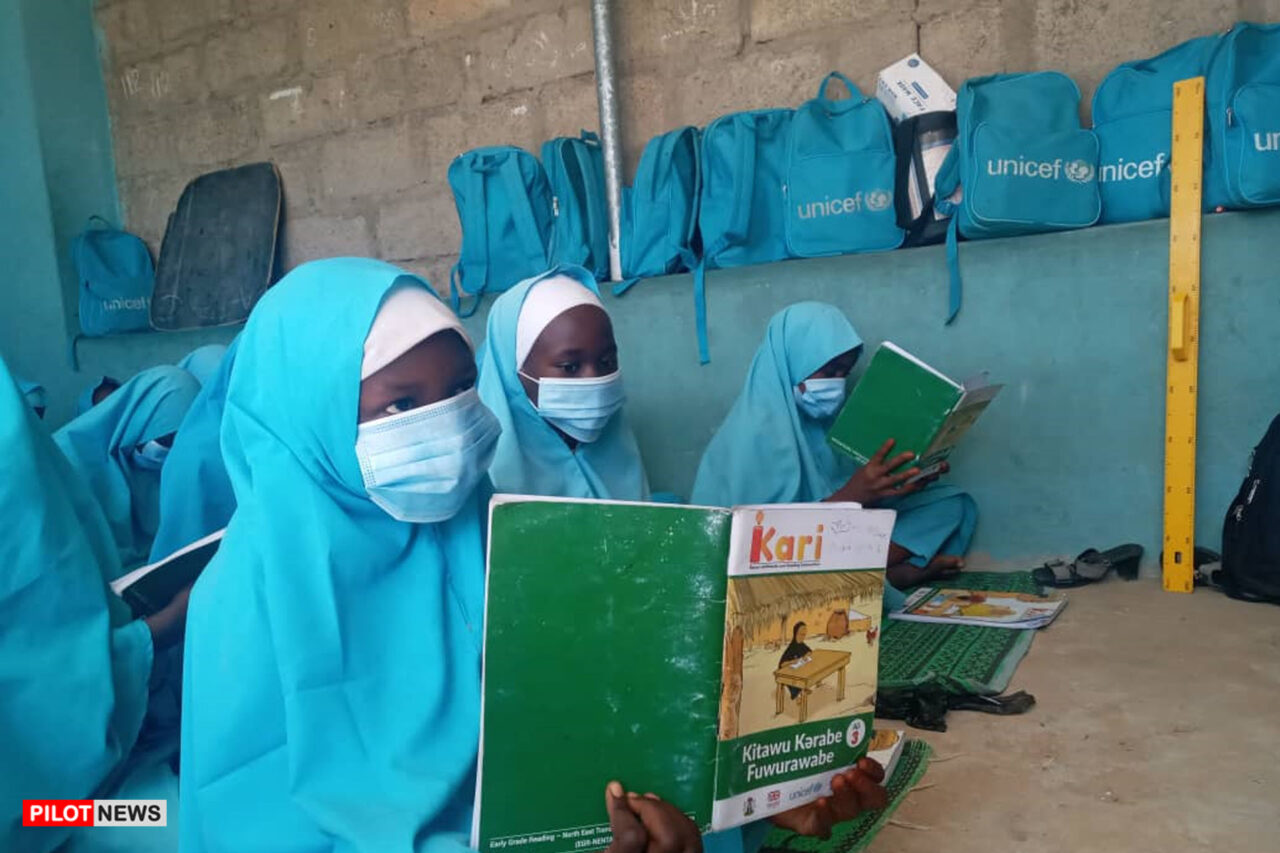Learning is no longer difficult for thousands of Kanuri-speaking elementary school kids in North East Nigeria as they now get to receive instructions in their mother tongue rather than Hausa, the widely-spoken language in the region, and the English language.
Children in Nigeria are failing to master basic literacy and numeracy skills. Nigeria accounts for one in five out-of-school children globally. And although most of these children are in the northern states where barriers to education include poverty, sociocultural norms, and insecurity, the North East region is the worst hit by this learning poverty. There are limited opportunities for learning across the region, especially in the conflict-ravaged Borno, Adamawa and Yobe States.
It is in this challenging environment that United Nations Children’s Fund (UNICEF) in collaboration with the Borno State Universal Basic Education Board introduced the Kanuri Arithmetic and Reading Intervention (KARI) to ensure that language is not a hurdle to learning for children.
“Kanuri Arithmetic and Reading Initiative (KARI) is focused on pupils in grades one to three, to improve reading amongst these learners, and it is based on a model called structured pedagogy,” Saadhna Panday-Soobrayan, UNICEF Chief of Education in Nigeria said as cited by TheGuardian Nigeria. “The first model involves teaching children how to read, while the second model has to do with remediating lags in the learning levels of the children in grades four to six.”
KARI is premised on Nigeria’s National Policy on Education (2014) which stresses the need for children to be taught in the language of their immediate environment in the first three years of elementary education. According to the policy, learning to read in early grades in a familiar language that one already speaks fluently is the most effective method of early-grade learning. Yet the policy alongside its corroborating National Language Policy, flagged off last November by the Nigerian government has not gained much ground.
Although Kanuri is the dominant language of approximately six million people in Nigeria’s North East, specifically the States of Borno and Yobe, teaching methods to encourage children to learn in their mother tongue have been poorly developed in the region, contributing to the large cohorts of out-of-school children. Even when children are in school, a substantial proportion are not learning.
But this bleak narrative is changing for the better with KARI. The programme, financed by the Foreign Commonwealth and Development Office (FCDO) of the United Kingdom government, is breaking the barriers to learning for children in the two North Eastern States of Borno and Yobe by providing Kanuri language textbooks and learning materials to first, second and third-grade schoolchildren to improve their literacy and numeracy skills.
Mohammed Saleh, the headmaster of Budum Primary School in Maiduguri, the Borno State capital, shared the learning outcomes of KARI in his school with UNICEF. “There are 4,788 children registered in this school. 90 per cent of them are Kanuri. In fact, this is a Kanuri community,” he said.
“We introduced KARI to the primary 1 and 2 children and the results have been fantastic. It is easier because it is their language, and they already speak it. The KARI approach is also fun because it has songs and other creative activities that children love.”
Budum Primary School is one of the public schools where KARI has been adopted. Others include Kulogumna Primary School in Maiduguri; Charamari Primary School and Central Primary School in Monguno local government area; and Kopa Learning Centre in Kopa, a small community on the outskirts of Maiduguri.
Besides the provision of Kanuri textbooks and learning materials to schoolchildren, UNICEF also trains teachers in the innovative learning approach. Panday-Soobrayan explained that teachers are trained “on the science of reading, using a combination of a whole language approach and onyx as a standard way of learning how to read.”
She noted that because the teachers “are not highly qualified, they don’t understand the science of reading”, they are also provided with a teaching guide that contains how to teach the children the different components of the lesson. This training is undertaken by 135 government officials from various government institutions and educational institutions.
In the Kanuri language, “kari” means “light” or “torch”. It is no wonder then that the Kanuri textbooks and other learning materials now being used in some public schools in the North East region for children in the first to third grades have become the light that illuminates the learning experience of enthusiastic learners from Kanuri-speaking homes.
Aishatu Mustapha Umar, a primary school student at Kulogumna Primary School is one of such children who now enjoys learning because it entails reading and writing in Kanuri, her mother tongue. “I love school now. Whatever I am taught I understand, unlike when I was taught only in English,” UNICEF quoted her as saying.
“The lesson sticks because it is taught in Kanuri. I am able to go over my lessons, rhymes and songs after school, over the weekend as I play, or in the mornings as I prepare for school because I remember them.”


